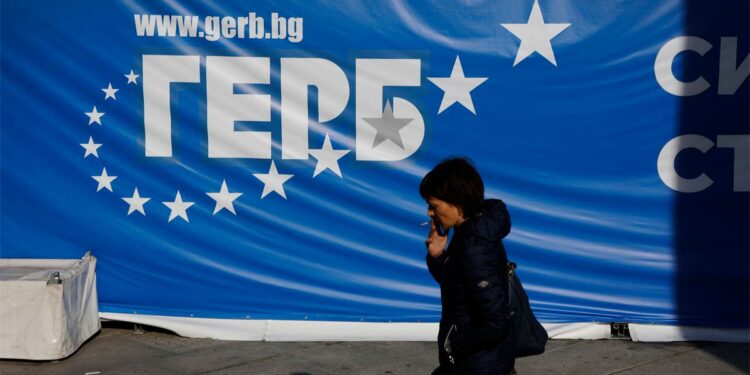When Bulgarians go to the polls on Sunday for the seventh time in just over three years, the vote is expected to yield more political gridlock, a democratic headache for the EU and a potential opening for Russia to meddle.
Between 2009 and 2021, the centre-right self-described ‘Euro-Atlantic’ Citizens for European Development of Bulgaria (GERB) party ruled mostly without interruption. But since 2021, there have been six parliamentary elections. GERB won four of those but failed each time to form a government, fuelling political instability and widespread distrust in the public sector.
The April 2021 election was a seemingly crucial turning point for Bulgarian politics. Dogged by allegations of fraud and corruption, GERB fell short of winning an outright majority for the first time in over a decade.
Since then, President Rumen Radev has been left to appoint a series of interim governments – often cobbling together ideologically opposed political parties – that fail to govern effectively and ultimately collapse, triggering fresh rounds of elections.
The country’s most recent coalition government – appointed following the June 2023 election – was comprised of an alliance between GERB and the centre-right Union of Democratic Forces (SDS) and the centrist-liberal PP–DB, an alliance between the We Continue the Change (PP) party and Democratic Bulgaria (DB). From the start, the coalition was hampered by personal rivalries and mistrust, leading to its downfall barely nine months later.
“GERB-SDS and PP-DB were serious political opponents,” Simeon Slavchev, a member of the Bulgarian Association of Legal Experts, told The Parliament. Frequent infighting meant the coalition made headlines for its squabbles rather than its limited policy agenda. The coalition led to a “complete collapse of statehood, morality and values,” he argued.
The government’s implosion in March 2024 triggered the most recent round of voting, in June, coinciding with the European Parliament elections. That one also failed to produce a clear winner with an outright majority, though GERB again took home the most votes.
Political paralysis
With another election just two days away, Bulgaria is bracing for more of the same, analysts and experts say.
“My prediction is that once again it will not be possible to form a regular government and in March 2025 there will be new and regular early elections in Bulgaria,” Slavchev said.
Meanwhile, Atanas Ilkov, the acting interior minister, said earlier this month that the ministry had received nearly 200 allegations of vote buying, but did not specify which parties might be involved. Such accusations aren’t encouraging Bulgarians to return to the polls, with voter turnout expected to be less than 30% on Sunday, down from 34.4% in June.
“A big majority of the Bulgarian population would like to see a stable, predictable government after the elections on 27 October,” said Andrey Kovatchev, an MEP in the European Parliament who hails from GERB and sits with the European People’s Party (EPP) group. “But they have wanted the same thing before.”
Sunday’s election is expected to produce similar results to June, according to polls, yielding another fragmented parliament. GERB-SDS are once again forecasted to win, with nearly 27% of the vote, while the PP-DB alliance and the pro-Russian Revival party are set to vie for second place at around 14%. Former media mogul Delyan Peevski’s centrist Movement for Rights and Freedoms (DPS) party is expected to take home around 7% of the vote.
Peevski’s growing presence on the political scene is in itself emblematic of the entrenched role of oligarchs in Bulgaria, experts say. A member of the National Assembly since 2009, he once owned 80% of the country’s print media distribution. In 2021, the US and the UK sanctioned Peevski, accusing him of corruption, bribery and embezzlement.
More broadly, Bulgarian democracy “has a problem with the traditional use of state institutions for private political interests,” Ivaylo Dinev, a researcher at the Centre for East European and International Studies (ZOiS), told The Parliament. “This leads to a decline in trust in them and a decrease in voters.”
Russia’s role
The election comes the same weekend as a highly anticipated vote in Georgia and a week after a referendum on EU membership in Moldova – two countries that have been plagued by alleged Russian interference.
“Eastern Europe is becoming a greater target of Moscow’s disruptive practices,” Maria Simeonova, head of the Sofia office at the European Council on Foreign Relations, told The Parliament.
A former Soviet satellite state, Bulgaria is today divided on the issue of its eastern neighbour. The still-dominant GERB is staunchly pro-EU, but support for the far-right, pro-Kremlin Revival party has been ticking upwards, according to recent polls.
If Bulgaria were to move deeper into Russia’s orbit, it would create new complications for EU, which relies on the country to help implement policies across security, defence and migration. “Bulgaria is an important country for the security of the eastern flank, bordering Turkey and having a Black Sea coast,” said Simeonova.
But beyond Russia, she said, the longer-term risk is a decreasing trust in the democratic process in Bulgaria. “Having a reliable government in Sofia is in the interest of the Euro-Atlantic community…especially in the face of autocratic regimes that challenge the very foundations of the EU.”
Source link : https://www.theparliamentmagazine.eu/news/article/can-bulgaria-break-its-political-stalemate
Author :
Publish date : 2024-10-25 10:32:00
Copyright for syndicated content belongs to the linked Source.


